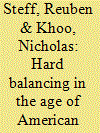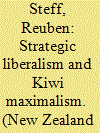|
|
|
Sort Order |
|
|
|
Items / Page
|
|
|
|
|
|
|
| Srl | Item |
| 1 |
ID:
119251


|
|
|
|
|
| Publication |
2013.
|
| Summary/Abstract |
Consensus amongst great powers on ballistic missile defence (BMD) may be the only way to ensure it does not undermine international security. This article applies defensive realism to explain the destabilizing effect of America's unilateral deployment of BMD. Under defensive realism, states opting for offensive strategies are punished, cooperation and reconciliation becoming more logical strategic options. The reversal of previous American policy under the Anti-Ballistic Missile (ABM) Treaty created a new security dilemma with China and Russia. Beijing and Moscow are not opposed to BMD in principle, though, and defensive realism provides a basis for improving relations, stressing joint deployment of BMD as the basis for a new paradigm of strategic relations. Defensive realism supports the conclusion that consensus amongst great powers on BMD is essential to strategic stability. It shows that the most likely alternative is worsening strategic action-reaction dynamics with unpredictable consequences. If BMD cooperation expands, however, domestic opposition will coalesce from groups with an interest in great power competition. Subsequent analysis should examine in more detail the role these groups play in influencing security policy and how they impede, or could facilitate, the emergence of BMD cooperation.
|
|
|
|
|
|
|
|
|
|
|
|
|
|
|
|
| 2 |
ID:
165146


|
|
|
|
|
| Summary/Abstract |
Small states throughout the Asia-Pacific are confronted by a growing dilemma over how to balance their traditional security ties with the US and rapidly growing trade with China. This gives Washington and Beijing potential leverage over small states to use within their competition with one another. This article explores the implications of this for New Zealand – a small South Pacific state that prides itself on maintaining an independent foreign policy. Situated within the small state literature, it utilises a material-based strategic triangle to illustrate the fundamental facets of New Zealand's position. Relatedly, the article examines how Wellington has managed its burgeoning relations with China and the US over the past decade and critically considers New Zealand's independent foreign policy. It finds that New Zealand has adopted a mixed set of strategies to manage its position between the US and China, closely aligning itself with Washington while remaining nonaligned on some key security issues in the Asia-Pacific region. New Zealand has certainly not opted for neutrality. The article concludes that New Zealand and other small states must remain vigilant, may want to consider alternative strategies of alignment, and outlines a number of areas where additional research could prove fruitful.
|
|
|
|
|
|
|
|
|
|
|
|
|
|
|
|
| 3 |
ID:
150248


|
|
|
| 4 |
ID:
131339


|
|
|
|
|
| Publication |
2014.
|
| Summary/Abstract |
One of the central debates in contemporary international relations scholarship concerns the issue of whether balancing has occurred in response to US-based unipolarity, and if it has, how this should be characterised. Existing research has seen analysts argue that major power responses to unipolarity can be placed in one of either three categories: an absence of balancing, soft balancing, and hard balancing. This article contributes to the scholarly literature by providing a case study of hard internal Russian balancing against the US's development and deployment of Ballistic Missile Defense (BMD) systems during the Bush Administration (2001-08). Russian hard balancing against the US has involved: (1) fielding new strategic nuclear and conventional weapons equipped with BMD countermeasures, and, relatedly, (2) making changes in military doctrine. As a result, security dilemma dynamics are increasingly in evidence in US relations with Russia.
|
|
|
|
|
|
|
|
|
|
|
|
|
|
|
|
| 5 |
ID:
146467


|
|
|
| 6 |
ID:
124951


|
|
|
|
|
| Publication |
Surrey, Ashgate Publishing Limited, 2013.
|
| Description |
xi, 226p.Hbk
|
| Standard Number |
9781409469353
|
|
|
|
|
|
|
|
|
|
|
|
Copies: C:1/I:0,R:0,Q:0
Circulation
| Accession# | Call# | Current Location | Status | Policy | Location |
| 057490 | 358.1740973/STE 057490 | Main | On Shelf | General | |
|
|
|
|
| 7 |
ID:
128038


|
|
|
|
|
| Publication |
2014.
|
| Summary/Abstract |
Although the Obama Administration has differed from its predecessor in a number of respects, on the specific issue of Ballistic Missile Defense (BMD), there is a striking continuity. The Obama Administration has remained committed to the BMD project, even as it has modified the schedule of deployments and prioritized different systems from the Bush Administration. Significantly, this has led to Chinese and Russian balancing in the nuclear sphere. As a result, there is evidence of a security dilemma-type dynamics in US relations with China and Russia. At present, there is no study that analyzes Russian and Chinese hard internal balancing against the USA in the sphere of missile defense during the Obama Administration. This article fills this gap.
|
|
|
|
|
|
|
|
|
|
|
|
|
|
|
|
| 8 |
ID:
173154


|
|
|
|
|
| Summary/Abstract |
Amidst the cacophony of the Trump presidency, is it possible to unearth the logic behind his foreign policy? Do his strategy and tactics stem from him or are they a response to the changing international structure? This article addresses these questions and seeks to evaluate the Trump administration’s foreign policy record on its own terms by examining his methods and objectives through three frames: ‘Art of the Deal’, ‘Make America Great Again’, and ‘Stable Genius’. By applying these frameworks to three cases: (1) migration, (2) NATO funding and (3) trade, the article finds that, in general, the policies and methods of the administration have been unable to achieve the President’s stated goals in the global arena. In conducting this analysis and evaluation, the article makes a novel contribution to understanding the policy and philosophy of the Trump administration’s foreign policy and enhances understanding of the policy outcomes that US diplomacy is attempting to achieve.
|
|
|
|
|
|
|
|
|
|
|
|
|
|
|
|
|
|
|
|
|